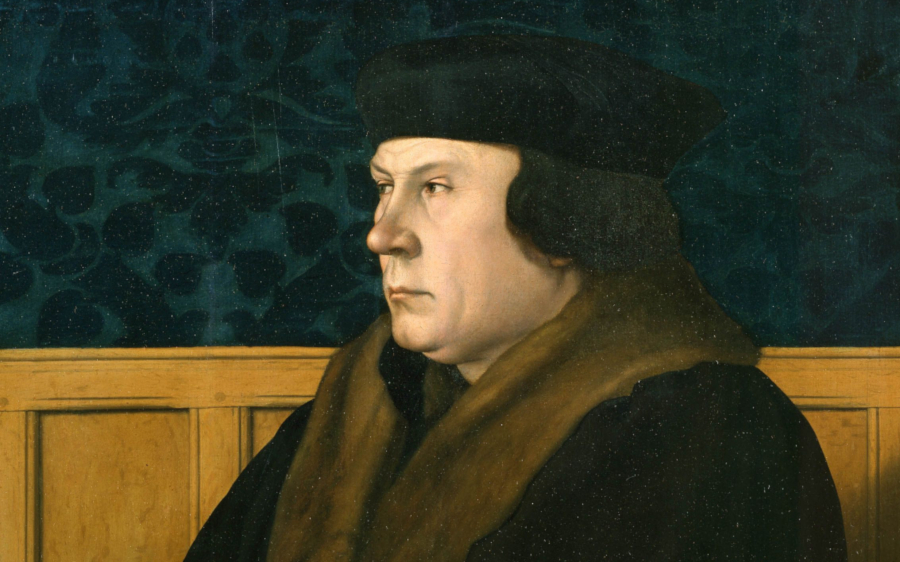
Detail from the portrait of Thomas Cromwell by Hans Holbein the younger. 1532–3. (Frick Collection, New York, Henry Clay Frick Bequest; source of image: Wikimedia Commons)
One of the joys of working with a union catalogue that combines correspondence metadata drawn from the research and publications of a wide range of scholars and projects is watching letter records accumulate for early modern individuals who have not been, thus far, a focus of attention in Early Modern Letters Online. Unintended catalogues you might term these, or ‘starter catalogues‘ (as we refer to them at present), each of which requires further collation of letter metadata to bring the inventory as close to completion as possible. For the past three years, funded by the Arts and Humanities Research Council [AHRC], EMLO has been involved in a partnership forged between the Cultures of Knowledge, the Networking Archives, and the Tudor Networks of Power projects with a focus on the correspondence identified in the UK’s early modern State Papers. The primary concern of this collaboration has been network analysis—including the development of customized investigatory tools—using metadata drawn from the Tudor and Stuart State Papers and running investigations on these data in combination with those contained in EMLO.[1. A range of outputs resulting from the Networking Archive project is in preparation for forthcoming publication and each will be announced on this blog post as it appears. The sheer volume of metadata cleansing, disambiguation, and reconciliation required for the project has led to an interruption in recent months of posts on this blog but, as we reach the end of the labour-intensive task and transition into a new phase, this will be remedied.] As a result of the data-cleaning conducted during the initiative, a number of ‘starter catalogues’ are emerging at EMLO that draw upon letters from these hitherto disparate datasets and link them with manuscript letters preserved in other repositories. Some are being prepared for publication as basic inventories that contain no more than minimal descriptions; others include abstracts of the letters published in the State Paper calendars (for example, that of the art agent, miniature painter, architect, and diplomat Balthazar Gerbier [1592–before 1667]), or abstracts from EMLO’s Bodleian Card Catalogue (you will find these in the letter records for the Orientalist, antiquary, and librarian Thomas Smith [1638–1710]). And an increasing number of ‘starter catalogues’ are in the process of being worked up still further with full transcriptions of the texts attached, as—with this week’s publication—in the correspondence of Thomas Cromwell, Earl of Essex (c. 1485–1540), chief minister to Henry VIII (and, yes, he is the Thomas Cromwell of Hilary Mantel’s trilogy and Mark Rylance fame).
In this particular case, Caitlin Burge, a PhD candidate at Queen Mary, University of London (funded by the London Arts & Humanities Partnership, an AHRC consortium) and a participant at the Networking Archives project Training School, is transcribing a number of Cromwell’s letters as part of her ongoing research into ‘Letters, Networks of Power, and the Fall of Thomas Cromwell, 1523–1547’. Thanks to current funding at EMLO from the Packard Humanities Institute, a small pilot batch of Caitlin’s transcriptions for a selection of letters in the British Library and The National Archives has been released in EMLO where they sit alongside letters records from Cromwell’s incoming correspondence that have been itemized already by Mary C. Erler during research on the abbess Margaret Vernon for her publication Reading and Writing During the Dissolution: Monks, Friars, and Nuns 1530–1558.[2. Mary C. Erler, Reading and Writing During the Dissolution: Monks, Friars, and Nuns 1530–1558 (Cambridge University Press, 2013).] Further records describing letters in the correspondence of the towering figure in Tudor politics and Reformation England will be added on an ongoing basis as they become available, either with inventory descriptions or with Caitlin’s transcriptions. And, as ever, contributions of additional metadata or transcriptions of Cromwell’s letters in the care of other archives (for example, those in the Worcestershire Archive and Archaeology Service) will be most gratefully received for this burgeoning catalogue.
Meanwhile, by way of background reading, EMLO users who have not explored these biographies might be interested in Tracy Borman’s Thomas Cromwell: The untold story of Henry VIII’s most faithful servant and Diarmaid MacCulloch’s Thomas Cromwell: A Life.[3. Tracy Borman, Thomas Cromwell: The untold story of Henry VIII’s most faithful servant (Hodder & Stoughton, 2014), and Diarmaid MacCulloch’s Thomas Cromwell: A Life (Penguin Random House, 2018).] And please don’t neglect either Hilary Mantel’s compelling fictional account of the son of a blacksmith who ‘put an edge on anything’, or the BBC adaptation of the first two books in her trilogy, Wolf Hall and Bring Up the Bodies.[4. Hilary Mantel, Wolf Hall (Fourth Estate, 2009); Bring up the Bodies (Fourth Estate, 20)12; and The Mirror and the Light (Fourth Estate, 2020).]
